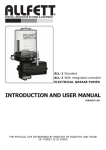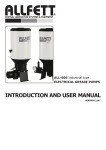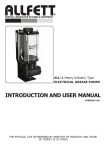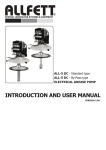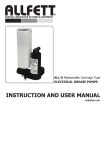Download Installation and Service Manual - Solar production Equipment Corp
Transcript
Solar Production Equipment Corp Chemical Injection Pump Installation and Service Manual www.solarproductionequipment.com Pump Models P-075-M1/8-1750-12 ALU P-075-M1/8-1750-12-SS CLASS 1 DIV 1 SPEC PUMP USER GUIDE Table of Contents Overview���������������������������������������������������������������������������������������������������������������������������������������������� 4 Pump Specifications��������������������������������������������������������������������������������������������������������������������������� 4 Installation instructions���������������������������������������������������������������������������������������������������������������������� 5 Location of pump�������������������������������������������������������������������������������������������������������������������������������� 5 Tubing Connections���������������������������������������������������������������������������������������������������������������������������� 5 Suction line����������������������������������������������������������������������������������������������������������������������������������������� 5 Discharge line������������������������������������������������������������������������������������������������������������������������������������� 5 Electrical Connections������������������������������������������������������������������������������������������������������������������������ 6 Priming the pump�������������������������������������������������������������������������������������������������������������������������������� 6 Routine Maintenance and repair�������������������������������������������������������������������������������������������������������� 8 Monthly maintenance check��������������������������������������������������������������������������������������������������������������� 8 1) Piston plunger bearing inspection.����������������������������������������������������������������������������������������������� 8 2) Pump motor wear check.������������������������������������������������������������������������������������������������������������� 8 Parts Replacement or Rebuild������������������������������������������������������������������������������������������������������������ 8 Re-assembly��������������������������������������������������������������������������������������������������������������������������������������� 9 Table of Figures Figure 1: Typical Installation Diagram������������������������������������������������������������������������������������������������� 7 Figure 2: Assembly Diagram (1)������������������������������������������������������������������������������������������������������� 10 Figure 3: Assembly Diagram (2)��������������������������������������������������������������������������������������������������������11 Figure 4: Typical Pump Assembly����������������������������������������������������������������������������������������������������� 12 2 www.solarproductionequipment.com SPEC PUMP USER GUIDE Overview Chemical injection pump SPEC Chemical Injection Pumps are used to accurately metre and inject chemicals at well sites and production facilities. The pump is a directly opposed, dual-head, reciprocating piston design. The pump uses an eccentric bearing mounted directly to the end of the prime mover shaft. The bearing fits into a close tolerance indentation machined into the middle section of the reciprocating piston assembly. The bearing moves in an orbit as the motor spins, driving the piston shaft back and forth between the horizontally opposed pump heads. As a result of this motion, the pump simultaneously draws fluid into one pump head while pressurizing the other pump head. As the bearing moves through 180 degrees, it reaches the end of travel, causing the piston assembly to reverse direction The pump consists of two directly opposed pump heads positioned between the suction and discharge manifolds. Two Poppet valves are located at each end of the pump, between the suction and discharge manifolds and the pump heads. As the piston plunger moves past the seal and into the bore of the pump head assembly, one poppet valve is forced open, while the other is forced closed. This causes fluid to be driven into the discharge manifold (pressure or discharge stroke). As the eccentric bearing drive assembly rotates through 180 degrees on the end of the motor shaft, the piston assembly changes direction and draws back from the pump head. The poppet valve operation reverses direction and the fluid is drawn from the suction manifold into the pump head (suction stroke). At the same time one of the horizontally opposed pump heads is pressurizing, the other pump head is drawing fluid from the reservoir, creating the concurrent suction and discharge. The pump repeats this operation, one discharge stroke and one suction stroke, at each of the opposing pump heads, for every 360-degree (full-circle) rotation of the motor. The motor is rotating at 1750RPM, equalling 3500 discharge strokes per minute. Pump Specifications Type Voltage FLA Maximum static pressure Maximum operating pressure Pumping Capacity Classification www.solarproductionequipment.com Dual-head reciprocating piston 12 VDC 14 3000 PSI 2500 PSI Maximum 1500 liters/day Class 1, div 1, Group D, T2D 3 SPEC PUMP USER GUIDE Installation instructions Location of pump We recommend that you locate the pump as close to the controller/battery enclosure as possible, while still observing the area classification as dictated by section 18 of the Canadian Electrical Code and any local code requirements. It is important to remember that the pump assembly is certified Class 1 Div 1 group D while the SPEC controller/battery enclosure is certified Class 1 Div 2. Since this is a 12 Volt DC-powered system, it is necessary to keep the distance between the pump motor and the batteries as short as possible (maximum 20”) to limit the line losses and maximize the pumps’ output. The pump is a gravity fed, flooded section design and therefore must be located below the fluid reservoir from which it draws. Tubing Connections There are two manifolds on the pump, one for suction and one for discharge. Each manifold is common to both the opposing pump heads. There is one threaded entry at each end of both the suction and the discharge manifolds to allow for installation flexibility in the field. The discharge manifold and its entries are always located at the top of the pump body and the suction manifold and its entries are located at the bottom. Suction line The intake or suction connection is identified by an ”S” stamped into the metal next to the 1⁄4” threaded entries on the suction manifold. The entries come from the factory with a stainless steel plug installed at one end. Configure the plug to facilitate the desired suction entry and connect the suction line. It is strongly recommended that the suction line have an appropriate medium filter installed directly ahead of the pump entry to ensure that particles do not enter into the pump head and plug up the poppet valves. Discharge line The discharge connection is identified by a ”D” stamped into the metal next to the plugged 1⁄4” threaded entries on the discharge manifold. Again, configure the plug to facilitate the desired discharge entry and connect the discharge line. The discharge line installation should always include a pressure safety valve (PSV) and recycle loop to insure discharge pressure is limited to a safe level. It is also necessary to place an in-line check valve in the discharge line, as close to the pump head as possible, to eliminate leak back and maximize pump efficiency. 4 www.solarproductionequipment.com SPEC PUMP USER GUIDE Electrical Connections The pump is a 12 volt direct current machine. Polarity of the connections is critical for proper functioning of the pump. Do not run the pump with reversed polarity as significant damage will occur. The leads are clearly marked for polarity: + is to be connected to the positive of the controller load terminals. The positive lead is also identified with a red band. – is to be connected to the DC negative bus. The motor feeders should be properly fused for protection as per the Canadian Electrical Code (Recommended Ferraz Shawmut ATP 12 or 15 Amp Slow Blow Fuse). Priming the pump The pump is designed to be self-priming and incorporates a flooded section design that requires some “fluid head” to operate effectively. The pump should not require any special attention to achieve priming. If you do encounter difficulty, you can bleed the plug opposite the discharge entry that you are using and allow the air to escape the manifold until the fluid stream is solid. Tighten the plug and the pump should now be primed. www.solarproductionequipment.com 5 SPEC PUMP USER GUIDE Minimum instrumentation tubing and accessory requirements for proper operation of the pump are: 1. A suitable medium filter (440 micron filter) placed in the feed line between the sight glass and suction port. The filter should be as close as possible to the suction port of the pump. B A 3 2 1 Figure 1: Typical Instrumentation and Electrical Configuration 2. A pressure safety valve (PSV) positioned in the discharge line, as close as possible to the discharge port of the pump, configured so that the discharge line pressure can be safely released back into the suction line in the event of a PSV valve release. 3. An inline check valve placed in the discharge line as close as possible to the discharge port of the pump and after the PSV Typical layout for the electrical feed to pump must incorporate: A. A CSA Class 1 div 1 electrical fitting, approved for terminations to connect the motor and conduit feed system. The motor is factory sealed and employs a 3⁄4” rigid nipple for connection to the fitting. B. A CSA Class1 div 1 approved flexible conduit or HL approved Teck Cable must be installed to allow for vibration as per the applicable codes. 6 www.solarproductionequipment.com SPEC PUMP USER GUIDE Routine Maintenance and repair SPEC pumps are designed for years of reliable service with minimal maintenance. All maintenance that is necessary must be carried out by qualified technicians. Monthly maintenance check 1) Piston plunger bearing inspection • Remove the four allen screws that hold the pump nameplate. • Inspect the piston plunger cavity for debris and remove any foreign objects or debris. • If bearing or piston assembly show wear they should be replaced. • Apply a small amount of grease to the reservoir pad. • Reinstall the pump nameplate 2) Pump motor wear check • At initial installation use a clamp-on amp meter to read normal motor current draw for the individual installation and record this measurement. • During routine maintenance, re-check the motor current draw. Readings should be within 10% of recorded measurements unless operating conditions have changed. If the motor current draw rises significantly, have the motor inspected by qualified personnel. Parts Replacement or Rebuild The only wear parts in the pump are the Seals, O-rings, piston assembly and bearing. Various replacement kits are available from SPEC. This type of maintenance should always be done in a clean environment. The drawings on pages 9-10 show an expanded view of the pump assembly. www.solarproductionequipment.com 7 SPEC PUMP USER GUIDE To replace O-rings and seals: • Disconnect all electrical connections before servicing. • Remove pump head from pump motor. • Disassemble as per drawings (note the orientation of the poppet valves) • Thoroughly clean all components. Blow out poppet valves, pump bodies, and manifolds in preparation for re-assembly. SPEC Seal Insertion Tool • O-rings: Discard old o-rings. Press the new o-rings into the depression in the pump body. DO NOT ATTEMPT TO INSTALL NEW SEALS WITHOUT A SPEC SEAL INSERTION TOOL • Seals: Carefully remove the old seals using the piston assembly to gently pry out the seal (see picture labelled #1 below) ensuring you do not scratch or mark the seal seats. 1 Insert the new seals into the pump body using the SPEC seal insertion tool provided in the kit and press the seal into place. (Note: the spring side of seal is placed toward the pump body). Re-assembly Once the new O-rings and seals have been properly installed, insert the poppet valves ensuring proper orientation (see 2 and 3). Align the suction and discharge manifolds with the valves and pump body. Use a large C clamp to press together and align the manifolds with the pump bodies (see illustration below). Install and tighten all eight manifold bolts. Tighten to 140 inch-lbs. Remove clamp and attach the pump body to the mounting plate and then reattach the completed pump head to the pump motor. 3 2 Suction 8 Discharge www.solarproductionequipment.com SPEC PUMP USER GUIDE Figure 2: Assembly Diagram (1) www.solarproductionequipment.com 9 SPEC PUMP USER GUIDE Figure 3: Assembly Diagram (2) 10 www.solarproductionequipment.com SPEC PUMP USER GUIDE THIS DRAWING IS THE PROPERTY OF SPEC INC. COPYING OR REPRODUCTION OF THIS DRAWING IS PROHOBITED WITHOUT WRITTEN CONSENT FROM SPEC INC. 10-12180 - 44st. S.E. Calgary, Alberta T2Z 4A2 GC Figure 4: Typical Pump Assembly 11 www.solarproductionequipment.com Thank you for choosing Solar Production Equipment Corp SPEC Solar Production Equipment Corp 10-12180 - 44st. S.E., Calgary, Alberta T2Z 4A2 Phone: (403) 730-5951 Fax: (403) 236-8858 24 hour emergency service: (403) 990-5558 Account inquiries (payables and receivables): [email protected] Sales or technical inquiries and field assistance: [email protected] www.solarproductionequipment.com © 2009 SPEC prepared by von Hauff Skalka Consulting












